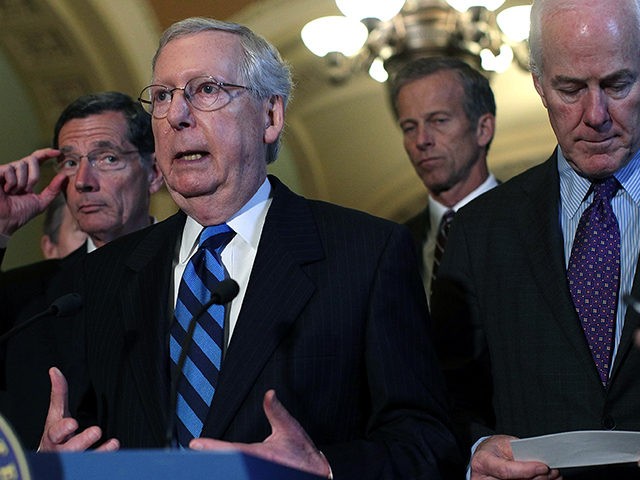The revised Senate healthcare bill, known as the Better Care Reconciliation Act (BCRA), contains several new handouts designed to entice moderate senators to support the healthcare bill.
Republicans maintain a slim majority in the Senate. Majority Leader Mitch McConnell can only afford to lose two senators to win a vote with Vice President Mike Pence breaking the tie. At this moment, Senators Rand Paul (R-KY) and Susan Collins (R-ME) oppose the new BCRA, so the Majority Leader cannot lose any more votes to pass the bill when it comes to the Senate floor next week.
The BCRA has two provisions that appear to benefit Alaska and encourage moderate Sen. Lisa Murkowski (R-AK), a critic of the Senate healthcare bill, to support the measure. Murkowski remains critical of the BCRA’s changes to Medicaid. The BCRA contains well over a $100 billion in stability funds to stabilize the health insurance markets and lower premiums for high-cost patients. One provision of the new BCRA dedicates one percent of the stability funds to “each state where the cost of insurance premiums are at least 75 percent higher than the national average.”
So far, Alaska remains the only state that fits this description.
The new BCRA also changes the Medicaid payments to hospitals based on a state’s overall uninsured population, not its Medicaid enrollment. Alaska expanded its Medicaid program under Obamacare, which would mean that the state would qualify for less Medicaid subsidies under the original BCRA. Under the new BCRA provision, Alaska would become eligible for more hospital Medicaid payments.
The BCRA imposes per-capita caps on Medicaid spending to cut the growth in the entitlement program, however, the caps on Medicaid spending will allow “late expanding Medicaid states” such as Alaska, Montana, and Lousiana to base their caps on looser standards. These states could then receive more Medicaid payments compared to other states. The change would entice Sens. Lisa Murkowski, Steve Daines (R-MT), and Bill Cassidy (R-LA) to vote for the bill in exchange for more Medicaid for their states.
A new provision under the BCRA would make services provided by a state to Indian Health Services enrollees subject to a 100 percent federal Medicaid match. Current regulations stipulate that only services received through an Indian Health Service facility whether operated by the Indian Health Service or by an Indian tribe would become subject to a 100 percent Medicaid match. South Dakota Sens. John Thune and Mike Rounds could take this victory back home as a victory. South Dakota Governor Dennis Daugaard pushed for this rule change for over a year.
Outside of the targeted provisions in the new BCRA, McConnell could include more last-minute amendments to lure more senators to vote for the bill. The BCRA retains Obamacare’s net investment tax and the Medicare “high income” tax, which means the bill saves another $230 billion in revenue. Between the extra $70 billion for state stability funds, $45 billion to combat the opioid crisis, as well as the lost $60 billion in revenue that would allow Americans to use health savings accounts to pay for premiums, Senate leadership will still have roughly $100 billion to bribe reluctant senators to vote for the BCRA.

COMMENTS
Please let us know if you're having issues with commenting.